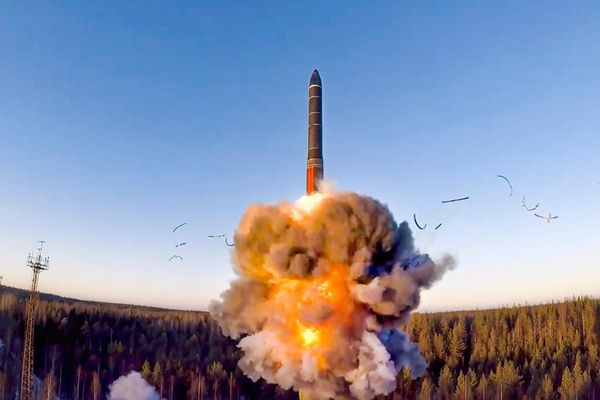
Australia's share market has lost much of the week's gains, after Israel's attack on Iran proved a brutal reality check for risk sentiment.
The S&P/ASX200 fell 17.7 points, or 0.21 per cent, to 8,547.4, as the broader All Ordinaries gave up 25.4 points, or 0.29 per cent, to 8,770.6.
Wednesday's dual-record intraday peak and best-ever close for the top-200 became a distant memory as Israeli air strikes on Iranian military targets and nuclear facilities prompted retaliatory drone attacks.
The escalating conflict also weighed on markets in Asia, as Hong Kong's Hang Seng index, Japan's Nikkei and South Korea's KOSPI all fell between 0.8 per cent and one per cent.
Eight of 11 local sectors lost ground on Friday, while energy and utilities stocks surged after oil prices spiked to four-month highs in the wake of the attacks.
Brent Crude futures had since eased, but were trading at $US72.40 a barrel at 5pm.
The elevation of global risk came at an inopportune time for the ASX and its financial sector, both of which hit new highs this week and showed signs of being overbought, IG Markets analyst Tony Sycamore said.
"You wouldn't want to be going home long on risk (assets) ahead of this weekend, because there's just so much uncertainty out there," he told AAP.
Meanwhile, the oil price spike could stoke inflation, just as central banks were easing monetary policy after finally tempering post-pandemic price growth.
"In the worst-case scenario, then potentially we see crude oil spike up towards $US100 (a barrel) and that takes inflation significantly higher," Mr Sycamore said.
"That reduces the ability of central banks around the world to ease interest rates, because they're then fighting another re-acceleration in inflation."
Energy stocks and utilities both surged more than four per cent, and the defensive consumer discretionary sector was the only other division in the green, up 0.25 per cent.
The spike in crude prices was good news for Woodside investors, as the oil and gas giant rallied more than seven per cent to $25.21, the top-200's best performer.
Financial stocks, which account for roughly half of the top-200's value, fell 0.4 per cent as three of the big four banks - excepting a flat Westpac - grinded lower.
The sector is roughly flat for the week.
Materials stocks fell 0.2 per cent, as rallying gold miners helped soften a sell-off in large cap miners BHP (-2.6 per cent) and Rio Tinto (-1.1 per cent), tracking with an uplift in gold and continued weakness in iron ore prices.
Gold itself rose to its highest level since the beginning of May to trade at $US3,445 ($A5,320) an ounce, spiking to within roughly one per cent of its $US3,500 all-time high.
Australia's tech sector took the biggest hit on Friday, down 1.2 per cent as investors fled to safety.
The Australian dollar is buying 64.76 US cents, down from 64.96 US cents on Thursday at 5pm.
Next week, four major central banks will set their policy rates, and while investors expect no changes, they will be looking for any pivots towards dovish rhetoric in light of escalating conflict in the Middle East.
"Not rate cuts, but setting up the idea that things have now become more uncertain and there is now more risk to global growth because of what happened this morning," Mr Sycamore said.
ON THE ASX:
* The benchmark S&P/ASX200 index finished Friday 17.7 points lower, or down 0.21 per cent, to 8,547.4
* The broader All Ordinaries lost 25.4 points, or 0.29 per cent, to 8,770.6
CURRENCY SNAPSHOT:
One Australian dollar buys:
* 64.76 US cents, from 64.96 US cents on Thursday at 5pm
* 92.99 Japanese yen, from 93.39 Japanese yen
* 56.10 Euro cents, from 56.39 Euro cents
* 47.83 British pence, from 47.89 pence
* 107.67 NZ cents, from 107.80 NZ cents







